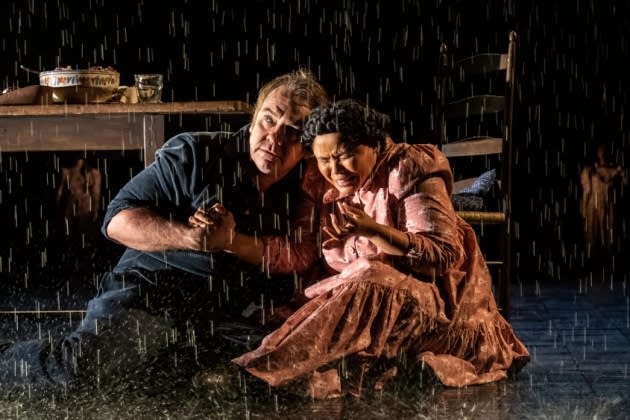‘The Crucible’ Review: A Soggy London Revival of Miller’s Masterpiece
- Oops!Something went wrong.Please try again later.
- Oops!Something went wrong.Please try again later.

There is an opera of “The Crucible.” Written by Robert Ward, it won the 1962 Pulitzer Prize. But this is not the opera… or is it? Lyndsey Turner’s grandiloquent National Theatre production of Arthur Miller’s imperishable 1953 classic is so overloaded with singing from the opening period-style choral folk song to a final major-key angelic chorus — not to mention a permanently portentous soundscape — that you could be forgiven for mistaking it for the opera. While some 69-year-old plays need dramaturgical assistance to be successfully revived, this is not one of them.
Turner’s decision to “assist” the play is also there in her equally operatic visual response. In 2016, she and designer Es Devlin transformed the naturalism of Brian Friel’s masterpiece “Faith Healer” at the 250-seat Donmar Warehouse by encasing the three-sided stage with a curtain of pouring rain lit so that the water gleamed like a cage of hard, white light. It was a fitting metaphor for Friel’s fictional village. Now reused for “The Crucible” in the 1,029-seat Olivier amphitheater, opening and closing the play and punctuating the scene changes, it seems less metaphorical, more an over-displayed effect.
More from Variety
'Jack Absolute Flies Again' Review: A Knockout New Comedy by the Writer of 'One Man, Two Guvnors'
Jimi Hendrix Documentary Boarded by DCD Rights - Global Bulletin
There are also text changes, with Turner adding an expository prelude and a coda from Miller’s writings about the play, in which the before and after is announced to the audience in a tone of high seriousness. The opening address is an immediate indication that the production doesn’t trust the text itself to do its dramatic work.
Although this political thriller was written in response to America’s mid-20th-century fever of McCarthyite witch hunts and the naming of names, there has, on either side of the Atlantic, never been a time when the play was not “relevant.”
And it’s to the play’s immense credit that successive productions have found in it a unique response to the tenor of its time. Dominic Cooke’s award-winning 2006 Royal Shakespeare Company production turned the play into a grippingly fierce distillation of the danger of fundamentalist thinking; Richard Eyre’s Broadway revival with Liam Neeson and Laura Linney saw the play as a portrait of personal integrity in the face of galloping political events. Part of the trouble with this new revival is that it lacks a clear perspective because the attention-grabbing production swamps the play.
Much of that stems from a lack of pacing. Miller’s handling of the manipulative lies of angry, spurned adolescent Abigail Williams (a suitably staunch and febrile Erin Doherty) — who stokes terror, harnesses resentments and ushers in the hanging of innocent townsfolk — is masterly. His tale features what should be engrossing and unceasing turns of the screw. But outside the obvious plot climaxes of the girls’ hysteria or the entrapment of individuals in the trial scenes, the production turns stealthy, enthralling writing into unvarying scenes that feel shouty, wordy and long.
Much of that is the result of the perma-doom soundtrack: constant, insistent underscoring and humming from the actors. By telling the audience what to think — “listen up: something terrible is about to happen” — the music relegates the dialogue to further accompaniment and flattens the drama.
It’s also down to Turner’s direction of the actors, too many of whom have been encouraged to overstate themselves from their first entrance. But by fatally playing the end of their dramatic trajectory at the very beginning, their character and motives are too immediately obvious. This leaves audiences with almost nothing to discern and disengages them from the moment-by-moment drama. That distancing is further extended by disconnected performances, including from the highly experienced Matthew Marsh, who relies upon a carefully over-precise delivery as Judge Danforth, channeling Kelsey Grammar’s Frasier Crane and thus merely coming across as a one-note version of self-deluded.
There are exceptions. As Mary Warren, who almost succeeds in escaping Abigail’s power and tries to tell the truth, Rachelle Diedericks puffs herself up nicely with power and, unlike a bewilderingly high percentage of the cast, her accent work is consistent.
Tim Lutkin’s fierce side lighting scalds the actors and allows them to be beautifully etched against enveloping darkness. His work has an arresting precision and depth that is woefully absent elsewhere. Even the central relationship between John and Elizabeth Proctor lacks traction because although Eileen Walsh is nicely pinched and tired as Elizabeth, Brendan Cowell’s John is too physically and vocally shambling. It’s a characterful performance but too generalized to allow crucial moments to land, not least his climactic, play-defining cry: “How may I live without my name?”
Karl Johnson is winning as the argumentative, honorable, elderly Giles Corey, who goes to his death for refusing to bow to the court’s double-think. He dies by being pressed with stones, his only words being “more weight.” Ironically, this entirely self-conscious production’s attempt to add more weight is what stifles the play.
Best of Variety
Sign up for Variety’s Newsletter. For the latest news, follow us on Facebook, Twitter, and Instagram.
